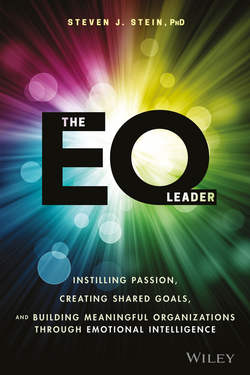Читать книгу The EQ Leader - Stein Steven J. - Страница 16
На сайте Литреса книга снята с продажи.
CHAPTER 2
WHAT HAVE WE LEARNED ABOUT LEADERSHIP?
Understanding the Ideal Political Candidate
ОглавлениеOf course, the presidential race between Hillary Clinton and Donald Trump presented an ideal laboratory and a historical opportunity for those of us interested in leadership and how leaders are chosen. At MHS, we decided to take advantage of this opportunity, and we conducted two surveys at the beginning of September 2016, before the election. In order to get a better handle of what the emotional intelligence of an ideal leader (in this case, president) would look like, we surveyed 1,000 American voters. The sample selected was one-third Democrats, one-third Republicans, and one-third Independents. Their ideal president, by political affiliation, can be seen in Figure 2.1.25
Figure 2.1 Ideal President EQ Profile by Party Affiliation (© MHS, 2016)
As seen in Figure 2.1, the results were fairly similar across the political divide, which is interesting as this was one of the most divisive elections in recent history. There were some differences: whereas self-declared Democrats prefer, in order of preference, a president who is highest in Impulse Control, Social Responsibility, and Reality Testing. Republicans prefer a president who is strongest in Stress Tolerance, Problem Solving, and Reality Testing. Independents want to see a president highest in Stress Tolerance, Problem Solving, and Impulse Control (see Table 2.1).
Table 2.1 Top Three Qualities of an Ideal President by Party Affiliation
All three groups seem to be in agreement that the least important of the emotional skills for a president are Emotional Expression, Self-Regard, and Emotional Self-Awareness.
What are the biggest differences between Republicans and Democrats? The biggest difference was in Social Responsibility, with Democrats rating that higher than Republicans. The Independents were close to the Democrats on this. So to win over Independents, the candidates had to show at some level they care about their communities and the world around them. Just caring about your own and nobody else may not win the hearts and minds of Independents. Perhaps Hillary Clinton was seen as too self-motivated to win over Independents. Or perhaps Donald Trump's message of bringing back jobs and repealing Obamacare (due to its escalating costs to subscribers) was demonstrative of Social Responsibility.
The next biggest difference was in Empathy, with Democrats rating Empathy as a more important trait in a president compared to how Republicans rated it. Independents fell right between the two. Democrats want a president who can read the thoughts and feelings of others. This seems less important to Republicans. This is a skill that Bill Clinton is widely regarded as excelling in. A turning point here may have been Hillary Clinton's declaring Trump supporters as “deplorable” and “irredeemable.” Many Independents may have found it unacceptable to write off nearly 50 percent of the electorate.
Finally, the groups differed on Impulse Control. Democrats wanted a president higher in Impulse Control; that is, more able to manage what they say and their behavior. They prefer a president who is more thoughtful and doesn't shoot from the hip. Independents fall somewhere between the two, but slightly closer to Democrats. This factor is less important for Republicans, which may explain why many Republicans are not bothered by Trump's penchant for impulsive use of Twitter.
Comparing Trump and Clinton to the Ideal
We then surveyed a new group of about 1,000 voters, once again almost equally divided among party affiliation. They were sampled with one of two alternate surveys, with 500 voters completing each survey. In one survey, Clinton's emotional intelligence was rated first; in the other survey, Trump's was rated.
As seen in Figure 2.2, neither candidate reaches the ideal president in terms of their emotional intelligence scores. They each have their peaks and valleys, though both Clinton and Trump score highest in Independence and Assertiveness.
Figure 2.2 Emotional Intelligence Ratings of Hillary Clinton and Donald Trump Compared to Ideal President
The biggest differences between the two are Clinton scoring higher in Impulse Control, Stress Tolerance, and Emotional Self-Awareness, while Trump scores higher in Emotional Expression and Assertiveness, and slightly higher in Independence. It could be that, contrary to what voters say they want, emotional expression and assertiveness are more attractive characteristics of political leaders. While I don't have the evidence here to support it, I would venture to speculate, based on my experience in screening hundreds of candidates for reality TV shows and following up on characteristics of successful contestants, that the combination of high emotional expression and assertiveness, and low impulse control may have been a contributing factor to Trump's victory. Just as Bill Clinton is a natural when it comes to demonstrating empathy, Donald Trump uses his well-honed skills to his advantage. His emotional expression (at times including mocking opponents), assertiveness (clearly expressing his likes and dislikes), and low impulse control (often drifting away from carefully scripted speeches) were a sharp contrast to Hillary Clinton's more often than not standard stump speeches. It helps explain, as one radio interviewer pointed out to me, how Trump filled stadiums with more than 20,000 people. In our president's study, we used other peoples' ratings to look at leadership, something that is becoming more common in leadership research and in organizations.
25
S. J. Stein and J. Deonarine, Can Emotional Intelligence Help Determine the Next US President? (Toronto, ON: Multi-Health Systems, 2016).
